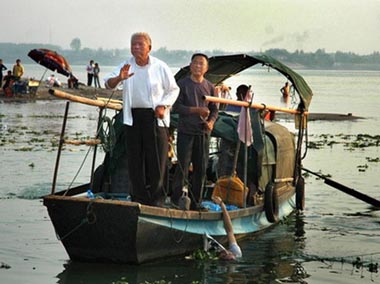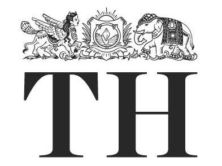
This prize-winning photo by journalist Zhang Yi has been accused of misrepresenting the events of an Oct. 24 drowning. (Credit: People.com.cn)
The photo that recently won China’s top news photography prize has been cleared of accusations that it is misrepresentative according to news reports. It was accused of being fake and branded as such by the media, but the photographer, journalist Zhang Yi, produced his entire photo set to prove his innocence, Chinese daily newspaper Xiaoxiang Morning reported.
The photo was published in the newspaper Chinese Business View based in Shaanxi provine, CriEnglish reporter Wang Wenwen wrote in an e-mail to iMediaEthics. Wang told iMediaEthics that despite accusations that the photo was faked, the Golden Lens committee found the photo to be legitimate.
The photo, called “Holding a Corpse for Money” or “Overcharging” by different news outlets, shows two men standing on a boat. It was taken in 2009, just after three 19-year-old college students drowned Oct. 24, 2009 rescuing two children from drowning themselves, and was awarded the Golden Lens award Aug. 13.
People’s Daily describes the Golden Lens Award as the “most academic and authoritative annual competition in news photography.” The Global Times noted that more than 22,800 photos were submitted to the Golden Lens contest.
The two children fell into a river in Jingzhou, Hubei Province, and ten college students formed a human chain to try to save them, China Daily reported last November. Nine of the students fell in the river in the process, and six were rescued. The three dead students are Chen Jishi, He Dongxu and Fang Zhao.
The photographer, journalist Zhang Yi, described the scene as a fisherman demanding money to remove the three dead bodies. If the fisherman didn’t get the money he asked for — 36,000 yuan (or $5,300 USD) — he would leave the bodies tied underwater. China Daily’s Liu Shinan reported last November that the friends of the three drowned students asked the salvage company to retrieve the bodies, but they were told it would be 12000 yuan a body.
But, a university director, Li Yuquan, claims the photo is misrepresentative and that the fisherman is actually calling for help. Li is the director of the party committee’s propaganda department at Changjiang University, which one of the three drowned students attended. Wang Wenwen of CriEnglish wrote to StinkyJournalism by e-mail that Li hasn’t responded since the Golden Lens committee verified the photo’s authenticity.
After Li’s claims, Zhang resigned from his job at a Jianghan Business Newspaper in Hubei province and left Jingzhou, but Zhang denied that the photo misrepresents what happened that day, according to CriEnglish.com, and ultimately, according to reports, proved his innocence of photo fakery.
Another problem: The Global Times named the man in the white shirt as Baling salvage company employee Chen Bo in an Aug 19 article. But, in an Aug 20 Global Times article, the white-shirted man is named as salvage company employee Wang Shouhai, and Chen as the salvage company boss.
iMediaEthics has written to the Global Times asking which is correct. Yang Jiebing wrote for weekly Chinese newspaper Southern Weekend that the salvage company boss is named Chen Bo and that the white shirted man is Wang Shouhai.
CriEnglish.com reported that the two men pictured in Zhang’s photo were “criticized by netizens for their mercilessness and beaten during the funeral for the three students drowned while trying to rescue children.”
Yet, Southern Weekend’s Yang wrote that on the day of the memorial service for the three bodies, one of the fishermen at the river that day, Chen Xuande, and his wife were beaten. Chen Xuande and another fisherman rescued one of the students who fell in the water forming a human chain, but wasn’t able to help anyone who was underwater, Yang reported. Chen also said that Chen Bo instructed him and other fisherman “not to retrieve any bodies in the Jinzhou section” of the river.
At a press conference at the time, the Jingzhou municipal government said the company didn’t break the law asking for the money, but the public security bureau held the company’s boss for 15 days and charged him 1000 yuan for asking for tip money from the victims’ friends, China Daily reported.
Stinky Journalism has also written to Hubei University attempting to contact Li Yuquan.
China’s Fake Photos
StinkyJournalism has written about numerous fake photos from China. Recently, we wrote about Hou Xie, whose photo “Tomorrow’s Reality” was published in Chinese Photography magazine. His photo has been called plagiarized and faked.
Also this summer, the winner of the Beijing Clean Water Alliance’s photo contest, Zhang Ziping, was accused of plagiarizing and doctoring his prize-winning photo.
And, the independent Chinese news publication The Epoch Times accused the Chinese regime of providing it with an inaccurate photo from the Nanjing City explosion. The Epoch Times, often critical of the Chinese government, wrote that it believes the government wanted to use the photo to discredit The Times.
iMediaEthics has also written extensively about Zhou Zhenglong, whose 2007 photo of a rare tiger in a province tigers aren’t found launched investigations, firings, and a jail sentence for Zhou. While Zhou’s photo was originally praised and used in publicity materials, it was later discredited by bloggers. Earlier this year, Zhou was taken into custody for violating his parole conditions. Zhou maintains that his photos are legitimate and was found searching for the tiger.







Comments Terms and Conditions